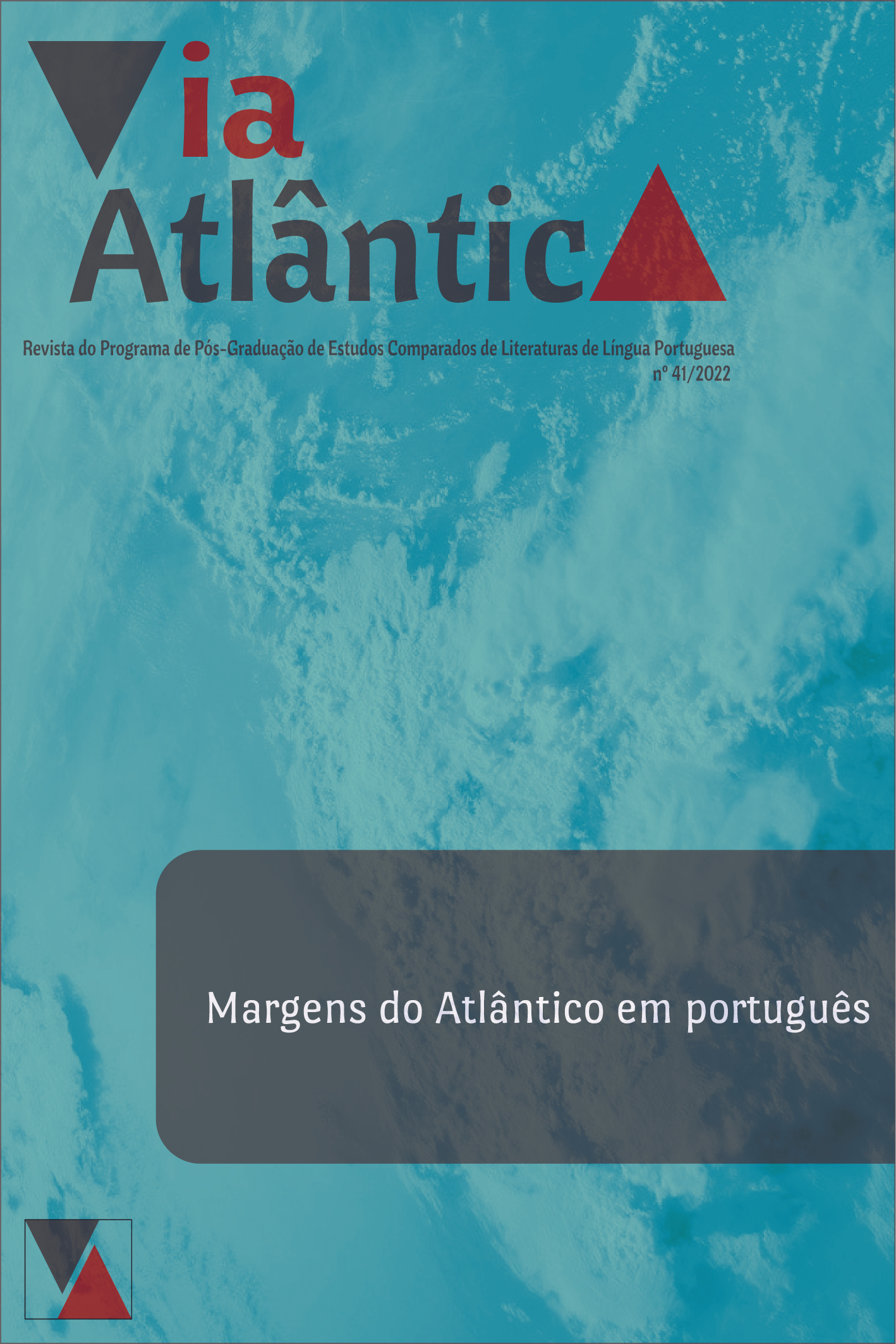When the Atlantic meets the Mediterranean: fantastic in The sky cannot dance alone, by Ondjaki
DOI:
https://doi.org/10.11606/va.i41.190880Keywords:
Angolan literature, short stories, post-independenceAbstract
: The goal of this essay is to recognize, in the short stories “Budapeste”, “Madrid” e “Giurgiu”, in the book The sky cannot dance alone (2014), by Ondjaki, the presence of characteristic elements of fantastic that help us to perceive other nuances in the author’s work. We take into account the theoretical contributions of Mata (2000), Cardoso (2008), Todorov (1999), Furtado (1980) and Ceserani (2006). The ambiguity and the first-person narrator are vital to fantastic narratives, because they lead the reader, showing the ways that must be followed. The first-person narrator many times finds itself threatened and experience unusual facts, which he does not seek to explain, keeping always the doubt about what is told in the story.
Downloads
References
CESERANI, Remo. O fantástico. Tradução de Nilton Cezar Tridapalli. Curitiba: Ed. UFPR, 2006.
CARDOSO, Boaventura. A escrita literária de um contador africano. In: PADILHA, Laura Cavalcanti; RIBEIRO, Margarida Calafate (orgs.). Lendo Angola. Porto: Edições Afrontamento, 2008. p. 17 - 25.
FURTADO, Filipe. A construção do fantástico na narrativa. Lisboa: Livros Horizonte, 1980.
GENETTE, Gérard. Figuras III. Tradução de Ana Alencar. São Paulo: Estação Liberdade, 2017.
MATA, Inocência. O pós-colonial nas literaturas africanas de língua portuguesa. IN: X Congresso Internacional da ALADAA (Associação Latino- Americana de Estudos de Ásia e África) sobre CULTURA, PODER E TECNOLOGIA: África e Ásia face à Globalização. 2000, Rio de Janeiro. Universidade Cândido Mendes. Disponível em: https://edisciplinas.usp.br/pluginfile.php/4033274/mod_resource/content/1/MATA%2C%20Inoc%C3%AAncia%20-%20O%20p%C3%B3s-colonial%20nas%20literaturas%20africanas.pdf Acesso em 15 de agosto de 2021.
ONDJAKI. Entrevista com Ondjaki. In: LEITE, Ana Mafalda et al. (orgs). Nação e Narrativa pós-colonial: Angola e Moçambique. Lisboa: Edições Colibri, 2012. p. 101-112.
ONDJAKI. Momentos de aqui. Lisboa: Caminho, 2001.
ONDJAKI. O céu não sabe dançar sozinho. Rio de Janeiro: Língua Geral, 2014.
PADILHA, Laura Cavalcanti. Entre voz e letra: o lugar da ancestralidade na ficção angolana do século XX. Niterói: EDUFF; Rio de Janeiro: Pallas Editora, 2011.
TODOROV, Tzvetan. Introdução à literatura fantástica. Tradução de Maria Clara Correa Castello. São Paulo: Perspectiva, 1999.
TURBOLI, Carolina de Azevedo. A travessia do narrador transforma tempo em espaço: O céu não sabe dançar sozinho, de Ondjaki. 107f. Dissertação (Mestrado em Letras Vernáculas) –Universidade Federal do Rio de Janeiro, Rio de Janeiro, 2016. Disponível em: http://www.posvernaculas.letras.ufrj.br/images/Posvernaculas/3-mestrado/dissertacoes/2016/3-TurboliCA.pdf. Acesso em 15 de julho de 2021.
Downloads
Published
Issue
Section
License
Copyright (c) 2022 Sabrina Ferraz Fraccari, Demétrio Alves Paz

This work is licensed under a Creative Commons Attribution 4.0 International License.
Authors who publish with this journal agree to the following terms:
- Authors retain copyright and grant the journal right of first publication with the work simultaneously licensed under a Creative Commons Attribution License that allows others to share the work with an acknowledgement of the work's authorship and initial publication in this journal.
- Authors are able to enter into separate, additional contractual arrangements for the non-exclusive distribution of the journal's published version of the work (e.g., post it to an institutional repository or publish it in a book), with an acknowledgement of its initial publication in this journal.
- Authors are permitted and encouraged to post their work online (e.g., in institutional repositories or on their website) prior to and during the submission process, as it can lead to productive exchanges, as well as earlier and greater citation of published work (See The Effect of Open Access).






















